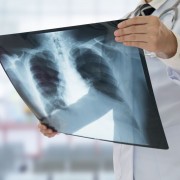Thoracic surgery
The most common cases when thoracic surgery is needed

Thoracic surgery refers to any surgery performed in the chest. It is done to treat diseased organs in the thorax area, which includes trachea, diaphragm, esophagus, heart and lungs. The most common diseases requiring thoracic surgery include:
Esophageal Cancer
Esophageal cancer usually begins in the cells that line the inside of the esophagus. Esophagus is a muscular tube that runs from the throat to the stomach. The esophagus carries food you swallow to your stomach to be digested.
The causes for esophageal cancer are not known. Esophageal cancer occurs when cells in your esophagus develop errors (mutations) in their DNA. The errors make cells grow and divide out of control. The accumulating abnormal cells form a tumor in the esophagus that can grow to invade nearby structures and spread to other parts of the body.
Lung Cancer
Lung cancer is the uncontrolled growth of abnormal cells that start off in one or both lungs; usually in the cells that line the air passages. The abnormal cells do not develop into healthy lung tissues; they mutate rapidly and form tumours. As these growth become larger and in plenty forms, they impair the lung’s ability to provide the bloodstream with oxygen.
Tumors that remain in one place and do not appear to spread are known as “benign tumors”. Lung cancer develops primarily by exposure to toxic chemicals. Smoking is the top risk factor primarily responsible lung cancer. Other environmental factors that may make a person more vulnerable to lung cancer include industrial substances as asbestos, air pollution and radiation.
Most lung tumors are not treated with thoracic surgery since patients seek medical care later in the disease process. Chemotherapy increases the rate of survival in patients with limited disease. Surgery may be useful for staging or diagnosis. The removal of the tumor and neighboring lymph nodes can be curative if the tumor is less than or equal to 3 cm, and presents as a solitary nodule. Lung tumors spread to other areas through neighboring lymphatic channels. Even if thoracic surgery is performed, postoperative chemotherapy may also be indicated to provide comprehensive treatment (i.e., to kill any tumor cells that may have spread via the lymphatic system).
Lung Transplantation
Lung transplantation is a surgery to remove a person's diseased lung and replace it with a healthy lung from a deceased donor.
Lung transplants are used for people who are likely to die from lung disease within 1 to 2 years. Lung transplants are a "last resort" treatment for people who have severe disease and no other medical options could work. A lung transplant can improve a person's quality of life. For people who have certain lung problems, a transplant also may help them live longer than they would without the surgery.
Lung transplants have serious risks. Your body may reject the new lung, or you may get infections. The short- and long-term complications of a lung transplant can be life threatening.
Risks Involved
Precautions for thoracic surgery include coagulation blood disorders and a detailed record of previous thoracic surgery history. Risks include hemorrhage, heart attack, stroke, nerve injury, embolism (blood clot or air bubble that obstructs an artery), and infection. Total lung collapse can occur from fluid or air accumulation, as a result of chest tubes that are routinely placed after surgery for drainage.
Related Articles
Waiting to inhale
Restoring airflow in the nasal passage to treat chronic snoring and improve sleep quality
Read moreUsing acupuncture to treat ear disorders
Traditional Chinese medicine such as acupuncture complements Western practice in treating persistent ear problems
Read moreThe world’s smallest hearing aid
The affordable, discreet Nanoplug is smaller than a coffee bean
Read moreLatest Articles
Medical Care
Achieving Swift Recovery: Enhanced Recovery (ERAS) Direct Anterior Approach Total Hip Replacement
Consider total hip replacement with Alps Orthopaedic Centre's ERAS Direct Anterior Approach for faster recovery and reduced hospital stays. Learn about Dr. Jerry Chen's expertise in Singapore.
Read moreMedical Care
Enhanced Recovery (ERAS) Total Knee Replacement
Discover how Alps Orthopaedic Centre's Enhanced Recovery After Surgery (ERAS) approach transforms total knee replacement into a day surgery, offering faster recovery, less pain, and reduced hospital bills. Learn about Dr. Jerry Chen's expertise and schedule your appointment in Singapore.
Read moreMedical Care
Clinical Exercise Physiologist (CEP): The Emerging of Exercise is Medicine
How Exercising can be a Medicine
Read more